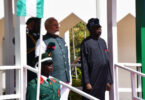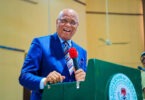An hour’s worth of power may be produced for N120, according to Chief Adebayo Adelabu, Nigeria’s minister of power.... CLICK TO READ THE FULL NEWS HERE▶▶
He pointed out that this is the reason why the federal government is increasing its electricity subsidies. He spoke at his Abuja office when members of the House Committee on Power paid him a visit for oversight.
According to Adelabu, the price does not include additional fees that the Nigerian Electricity Supply Industry (NESI) pays to power utilities.
“Those in Band A are paying N209 while Band B is paying N65, the average cost of producing one kilowatt per hour of electricity, its generating cost, is not less than N120 before we have the evacuation and wheeling and distribution charges.

“So anybody paying N65 or N58 is paying way below the cost and that is what the Federal Government is still subsidizing,” he stated.
He added that the government intends to move as many clients as possible to band A by accelerating the sector’s infrastructure.
More hike in tariff coming
In order to save the industry from illiquidity, he said the ministry is thinking about examining the tariff other bands pay.
“Probably in the next 6 months, we may have to go to the president and present a new tariff policy that will dictate how much will be paid by other bands but we don’t want that route now.
“We just finished the protest and we don’t want anything that will trigger any protest. We have to be very sensitive,” he stressed.
He continued by saying that the electricity industry had produced, transmitted, and distributed 5,155.99 megawatts of power for the first time in three years.
“Precisely on the 8th of August, 2024. When this administration came in, we met an average of 4,000 megawatts of power being generated and transmitted.
So I believe that 5,000 megawatts is not something we should celebrate.
But if you look at it from the perspective of 5,000 megawatts, 2,000 megawatts were achieved in 1984, for Nigeria. It took us over 35 years to achieve an additional 2,000 megawatts that took us to 4,000.”











